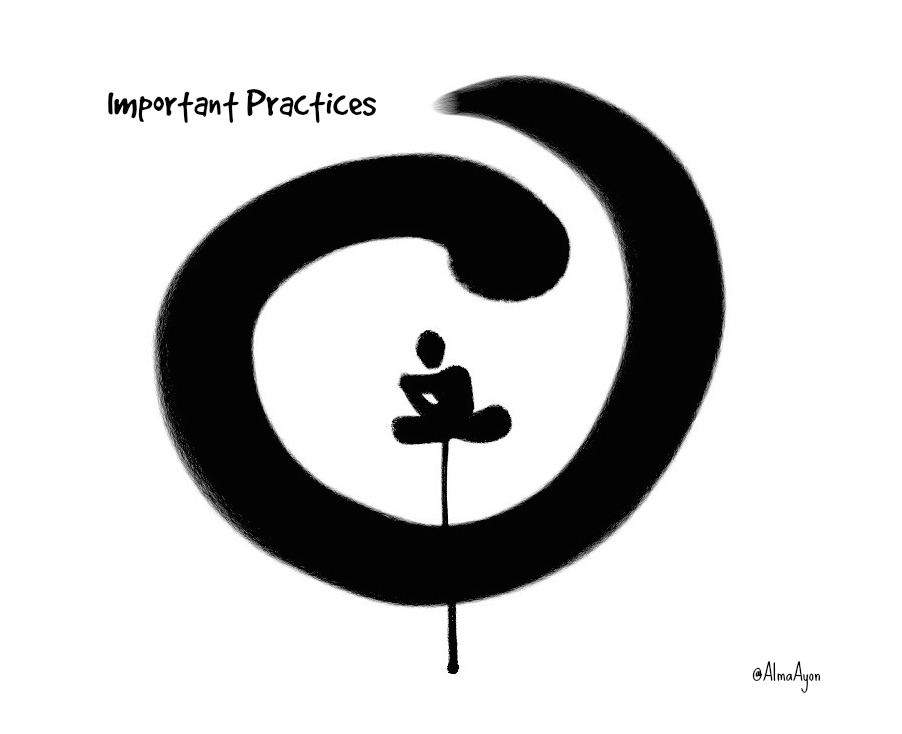by Alma Ayon | Aug 20, 2017 | attention, meditations
Remember what you did last Monday. Do you remember what you ate? The clothes you wore, the people you met, the things you said?
Does it take a little work to remember? Perhaps it is because we constantly receive so much information and when we want to concentrate on what happens in the present there are so many distractions!
Our attention jumps from side to side, trying to multi-function on various tasks. When we decide to focus on a thing we can stay focused 3 to 10 seconds, before our mind begins to distract ourselves with thoughts, after 10 minutes of performing an activity, there is something that interrupts the flow of our attention and distracts us.
There are two practices in which we want to train our mind, the first is mental presence, through which we have an open attention to all the senses, aware of everything that is happening at the moment, without focusing on one thing in particular, but without leaving unnoticed something that is happening in the present.
The second practice is focused attention, we choose to focus and concentrate on something that is happening or we are doing in the present. We leave everything else in the periphery of our attention and as we concentrate more, we enter the state of flux where we no longer notice anything other than our object of attention. We lose track of time and what surrounds us. When we are so concentrated, joy arises and we enjoy what we are doing. But many times when we concentrate we become tense, so it is important to be aware of our body and mind and learn to relax them.
Both practices require mindfulness which is the ability to pay attention but also to remember to bring our attention back to the object.
The first thing to do is to recognize what it is important for us, and to give our attention to it, we need stop wasting our time by attending to thoughts and fantasies that have no relevance to our goals, and to focus here and now on what is truly important.
As we train more and more our attention, we become more efficient and we are able to make progress in what is important, so it is important to strengthen our attention through constant practice.
I recommend the following articles to continue learning about the training of this wonderful faculty of care:
Transform your mind
How to focus on your goals
***
Share your experience with these practices in the comments section below!
by Alma Ayon | Aug 19, 2017 | attention, reflections
Our mind constantly pursues all kinds of desires, from the moment we wake up until we go to bed we compulsively pursue what we believe will bring us pleasure, well-being or happiness, and we try to avoid pain, discomfort and suffering.
The problem is that we want to achieve many things but we do not have the time to do all of them. At the end of the day we end up with a feeling that we have not progressed enough.
The first thing to ask ourselves is what is our motivation, why do you want to get what you are after? It all comes down to wanting more pleasure, recognition, success, stability, security, control or being loved and respected.
Now try to think if the achievement of your goals will benefit other beings. How would you feel if you succeeded in one of these goals, where you not only benefit yourself, but also those around you? A selfish motivation will bring you a brief pleasure while an altruistic motivation will bring you great lasting satisfaction.
To achieve any goal, you need effort and dedication, but above all a FOCUSED MIND and a CLEAR MOTIVATION.
- Start by focusing on only 1 to 3 goals, which are really meaningful and complement each other.
- Determine yourself to let go of all those little goals that only distract you and focus only on your main goal.
- Practice mental training in attention to develop a focused and clear mind.
Do you find it easy to focus your mind?
I am interested in knowing if you have practiced some technique to improve your attention and concentration. How long have you practiced? Do you have any advice for someone just beginning? Do you have any advice to share? Or any questions about the methods I share here?
Please leave a comment. Your experience could really benefit someone else.
by Alma Ayon | Aug 9, 2017 | emotions, reflections
When we are depressed, we perceive everything in a negative way, we feel defeated, without the intention of undertaking any activity, we do not see sense in striving to achieve something, we feel unmotivated.
On the one hand we can reflect that there is a certain wisdom in those moments, that of knowing that no matter how hard we try to get satisfactory stimuli, fame, money, power, knowledge, etc., none of these things will bring us lasting happiness, since everything we accumulate we will lose over time, besides striving is not a guarantee that we will succeed, surely we will have failures and disappointments, then why even make effort to get out of bed, and undertake new activities?
All these thoughts combined with the thoughts that arise from the losses and failures that we have already had in the past, and the present thoughts about what we lack, what we want to be and aren't, etc., can cause sadness, disappointment and frustration to arise.
We all want to feel happy without having to make a tremendous effort to get, fight, acquire, protect, pretend, etc., and we can do it if we just stop doing what has us trapped in depression: believing our thoughts, feeding them , and obsessively review them until they generate destructive emotions.
The only thing we have to do is to stop struggling with that inner dialogue that tells us what we should be, do, or constantly judge us for not being good enough, successful, intelligent and so on. Stop listening, ignore it and let our minds rest in the stillness of being aware here and now.
At first that voice will intensify by wanting to be heard, only thoughts that arise out of habit, but as we ignore them these will become less frequent.
Instead of paying attention to them, we direct our mind to the sounds that surround us or to our breathing. Whatever is happening in the present, here and now, is an anchor for our mind to rest.
Stop identifying with depression and the thoughts that produce it, is the way to find peace of mind.
Sometimes it is very difficult not to let ourselves be carried away by thoughts and emotions, so a useful method is to focus our attention on the beneficial things and actions that other people are carrying out in the world, and to rejoice in the help they are giving to other humans or animals. Feeling empathy for others makes us feel good. Let's try to focus on helping those around us.
by Alma Ayon | Aug 7, 2017 | emotions, wisdom
Our society overestimates productivity, and many people live unhappy by the demand to have to be productive, the consequence of this system is people who get carried away to the extreme of work and stress. Although occupational therapy has its benefits, if we thoroughly analyze the purpose of it, it is to distract the mind with activities and entertainments. On the one hand fulfills its function of removing painful stimuli and focus attention on another activity, but on the other hand it does not allow us to observe the mind and discover its potential to heal, balance and find a happiness that is not based on external stimuli.
Everything in our society is oriented to distract us and entertain us, television, the internet, social gatherings, etc. The consequence of this is that when the human being is alone and without activity that distracts him he begins to become aware of the anxiety, fear, loneliness, depression and other emotions that have been outside the threshold of consciousness while he was distracted. Many can not stand it and run for activities, people and anything that entertains them and distracts them from their great fear: being with themselves, without a stimulus. We have become addicted to activity and this has mental and physical consequences.
As Blaise Pascal (1623-1662) put it: "When I have sometimes set myself to consider the different agitations of men, and the perils and the pains to which they expose themselves in the court, in war, whence arise so many complaints, passions, rash and often wicked enterprises, I have often said that all the misery of man arises from one source, which is, that he cannot remain at rest in a room."
I invite you to learn to be in control of your thoughts and emotions regardless of the circumstance you are in, to train your mind so that you can find peace of mind both in solitude and in company, to become independent. For this I suggest exercises based on mental training and the cultivation of emotional balance. It is to help you direct your attention in a voluntary and sustained way, to teach you to differentiate between reality and the ideas you project about yourself, others and situations, as well as to train your mind to be aware when a destructive emotion begins to emerge, and to be able to release it before entering into the refractory period and have an impulse reaction like that of hurting yourself or others, to help you to cultivate motivations and intentions that guide your life in a constructive direction, as well as the cultivation of empathy for the suffering of others and cultivate equanimity when difficult situations arise in your life, and finally to help you discover that in solitude you can also find peace of mind, clarity and happiness if you learn to observe the flow of thoughts, emotions and mental events that arise, dwell and fade, without clinging to, or identifying with them. Cognitive fusion is the root of the problem and one can be free of it, if one learns to distance oneself from destructive thoughts and emotions.
by Alma Ayon | Oct 9, 2016 | meditations, videos
Our mind is like a waterfall, if we learn to relax in the present we can see it more clearly. That's meditation.

